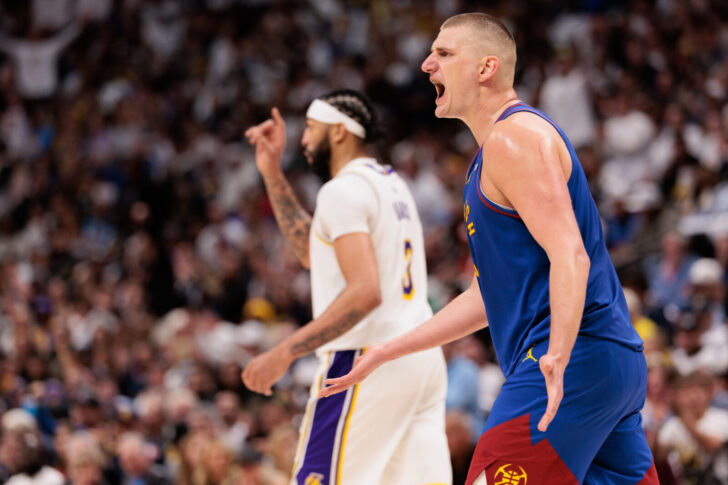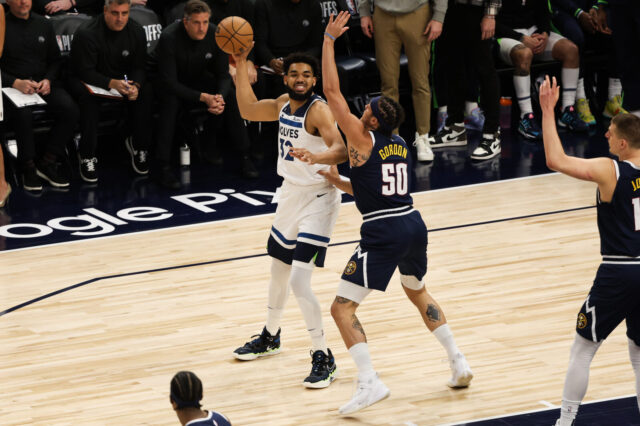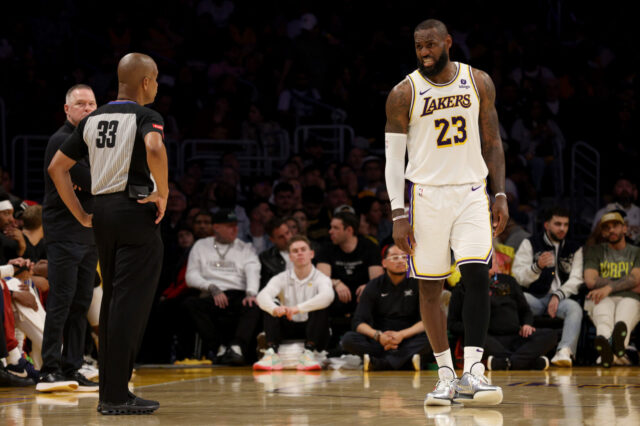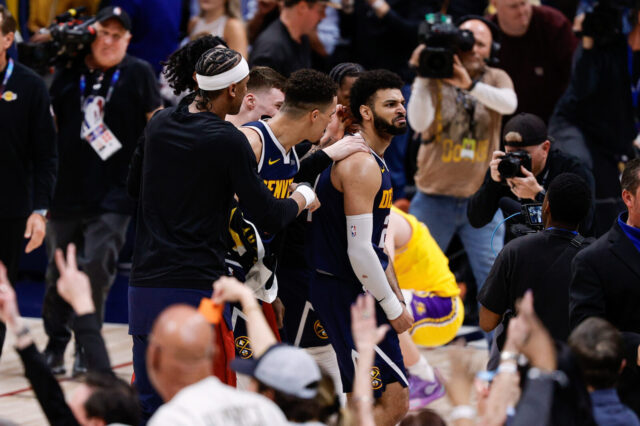After defeating the Los Angeles Lakers 114-103 in Game 1 of their first round series last Saturday, the Denver Nuggets enter Game 1 tonight with some confidence.
The Nuggets have now won nine matchups in a row against the Lakers (regular season and playoffs) by margins of 13, 6, 5, 11, 2, 12, 8, 10, and 11 points. The average margin of victory? 8.67 points. Just the difference of a couple possessions here, a miraculous shot from a star there, or maybe a few free throws (just kidding).
Every single game has been close. There’s never been a moment when Denver’s been truly, truly comfortable throughout the entire contest. Yet, that’s probably the secret for this Nuggets team. They’ve always been comfortable being uncomfortable, dating back to last year. They’ve trusted the work they put in, the shots they get, and their commitment to executing a plan of action.
On Saturday night, Jamal Murray shared a quote that I thought was very interesting and encapsulates exactly who the Nuggets are and why they’re comfortable in tough moments. From Saturday’s article:
“I just think we understand, we’re not trying to do anything different. We’re not trying to make stuff up,” Murray shared. “Everybody knows where they should be, and everyone knows that if they’re where they should be, they’ll get an open shot. That’s the beauty of this team. It’s just pure basketball.”
More than perhaps any team in the NBA, the Nuggets trust each other. They believe in the decisions their teammates are making, whether it’s Nikola Jokic attacking a post mismatch, Murray staying aggressive with the ball in his hands, Michael Porter Jr. or Kentavious Caldwell-Pope taking a quick three, or Aaron Gordon connecting it all together. The Nuggets starters in particular have that faith. In 25 minutes during Game 1, the Nuggets starters were +14. That was the third highest plus-minus of any lineup to play this weekend, despite Denver’s starters shooting just 6-of-18 from three-point range.
In fact, according to NBA.com, the Nuggets as a team shot 9-of-26 on what the NBA classifies wide open threes in Game 1, which was the most of all the teams to play on Saturday.
The Nuggets generated 26 wide open threes in Game 1, according to https://t.co/LxY12tGxb7, the most of all teams to play on Saturday. They shot 9/26 (34.6%).
Most of the threes looked like this ⬇️ pic.twitter.com/1tSZrWp8z2
— Ryan Blackburn (@NBABlackburn) April 22, 2024
Now, not all threes are created equal, and the Nuggets would surely like to generate more threes in the corners and in transition. The Nuggets shot 5-of-11 (45.5%) from the corners and 10-of-29 (34.5%) from above the break, which isn’t such a wild percentage that it can’t happen again. If anything, the Nuggets could shoot worse from beyond the arc in future games, and it’s good that they found a way to win a game in which they attempted 42 three-pointers. During the regular season, the Nuggets had a 3-4 record in games they attempted 40+ threes, and those usually coincided when opposing teams protected the paint well.
That’s exactly what the Lakers did, and it shouldn’t be surprising against a team that features Anthony Davis. The Lakers center played 45 minutes on Saturday, blocked four shots, and altered several more throughout the game. When he was the floor, the Lakers always had a rim protector out there, and that changed Denver’s shot profile just a little bit.
The Nuggets must continue to find ways to attack the paint, even when Davis is out there. When Davis is guarding Jokic, that means involving Davis in the pick and roll with Murray and Murray getting downhill. The more pressure Murray applies to the rim, the more consistently Davis has to rotate over to Jokic, leaving opportunities open for Jokic floaters and off-ball cutters.
Murray can learn from some of his drives. There are times when Davis is roaming in his vicinity that Murray didn’t sense Davis coming over to block the shot. He and the Nuggets will have seen this, and there’s an opportunity for drop-off dunks to Aaron Gordon in this situation.
The Nuggets did ultimately settle into a rhythm though, especially with Jokic being guarded by LeBron James or Rui Hachimura. James did a valiant job denying Jokic the ball at times, but outside of those possessions, the Nuggets basically got whatever they wanted against the “power forward guards Jokic, Davis guards Gordon” adjustment. Whenever Jokic caught the ball close to the rim against a smaller guy, he immediately looked for his own shot and didn’t waste time thinking about Davis and other variables.
Some of the post-ups, especially in the brief minutes when Davis wasn’t even on the floor, were downright terrifying.
It’s for this reason that I’d expect Davis to guard Jokic more frequently in Game 2. The Lakers looked overwhelmed by the Nuggets in the paint and in rotation when the Nuggets got going in the second half. For that reason, the Lakers finished the game with Davis guarding Jokic for much of the fourth quarter. Jokic missed some shots he often makes against Davis, but the bigger, more athletic Davis was more effective in 1-on-1 defensive coverage against Jokic later in the game, probably because he didn’t have to do it for much of the first three quarters.
Lakers fans will take solace in the matchup data on NBA.com that says Davis held Jokic to just 2-of-7 from the field when guarding him directly. Going back and looking through those possessions, Davis got away with some fouls, and on a night when Jokic attempted 23 shots, 17 of which came from inside 10 feet, I’d expect free throws to be more of a story in Game 2.
The other aspect of Davis matching up with Jokic more consistently though involves fatigue. Jokic looked like he normally looks at the end of the game while Davis looked gassed. Jokic played 39 minutes on Saturday while Davis played closer to 45 minutes. Davis also staggered with the second unit to try and prop up those bench rotations. The Lakers tried to save him from guarding Jokic as frequently early on, but if they have to rely upon Davis to 1. Guard Jokic more frequently, 2. Stagger with the second unit, and 3. Maintain efficient scoring…that’s a tall task for anyone.
People forget that the Lakers have played two additional intense games that the Nuggets didn’t this year: the In-Season Tournament championship, and the Play-In. That’s an 83rd and 84th game that aren’t on Denver’s schedule. Davis played 41 and 40 minutes in those games respectively, and he already played 2,700 minutes across the other 82 games. If including the other two games, Davis has played more minutes this year than all but seven other players in the NBA.
Now, he’s at altitude playing against the strongest, most difficult defensive cover in the NBA, and it looked like it was catching up to him by the end.
This is a problem that the Lakers don’t have an answer for. If Davis tires out, then it’s Hachimura, LeBron, or Jaxson Hayes guarding Jokic. Apparently, Christian Wood is going to make his return from injury in Game 3, according to Shams Charania. He might give Davis some breathing room, if only because he’s another big body. I doubt the Nuggets are that worried about finding ways for Jokic to take advantage of another big man that’s way smaller than Jokic though.
For the Nuggets to win Game 2, they must continue to put physical and mental pressure on the Lakers. Everyone knows the Nuggets have won nine in a row against the Lakers. The Lakers know it most of all, and the longer this streak continues, the more it will affect the team.
The Lakers are going to try to snap that streak with desperation in Game 2. It wouldn’t surprise me at all if they alter their game plan significantly, hunt Jamal Murray more on post ups vs LeBron, and perhaps get other guards like Gabe Vincent and Spencer Dinwiddie more involved in favor of D’Angelo Russell. The Lakers know they can’t have Russell shoot 6-of-20 again, and if he has a slow first half, it wouldn’t surprise me to see his minutes cut all the way down.
If the Nuggets can force the Lakers to break from their initial game plan first, that’s a win for Denver, because the Nuggets must only tighten up their execution of what was already a good game plan. The result was the same, even if Denver’s path to getting there was a bit different.
Let’s see if the Nuggets can do it again tonight.



